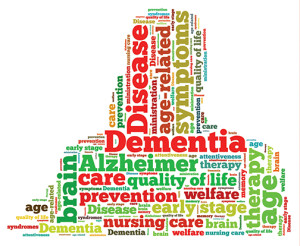Dementia Awareness With Helpful Links
Posted on November 3, 2015 by bob in In Every Life
November is Dementia Awareness Month. Dementia can be loosely translated as de=without and mentia=mind processes. Dementia is a slow, progressive loss of abilities of the mind. Dementia can be  confused with delirium (a more sudden change from usual thinking ability), or with depression (a separate process affecting thinking ability). Individuals and/or their families may initially notice slight difficulty remembering tasks, names, and/or locations. These subtle signs should be discussed with a healthcare provider to allow individualized assessment for possible improvement of contributing factors. Noticing symptoms can help determine the cause and is therefore the most appropriate treatment for changes in thinking.
confused with delirium (a more sudden change from usual thinking ability), or with depression (a separate process affecting thinking ability). Individuals and/or their families may initially notice slight difficulty remembering tasks, names, and/or locations. These subtle signs should be discussed with a healthcare provider to allow individualized assessment for possible improvement of contributing factors. Noticing symptoms can help determine the cause and is therefore the most appropriate treatment for changes in thinking.
Although Alzheimer’s Disease (AD) is commonly associated with dementia, there are many other issues that can affect the processes of the mind: infections, dehydration, electrolyte imbalances, effects of alcohol, medication, head injury, small or large blood clots to the brain (vascular dementia), disease processes such as Parkinson’s, Lewy Body, Pick’s Disease, Human Immunodeficiency Virus (HIV), and others. Improvements in assessment of dementia include blood testing or computerized brain scans, but thorough documentation of behavior changes and the time of day they occur can provide vital information useful for identifying possible underlying issues. See the National Institutes of Aging website for more information (https://www.nia.nih.gov/alzheimers/topics/other-dementias).
Dementia’s progressive nature allows for anticipation of various behaviors over time. The Alzheimer’s Association provides a reference for possible behavior changes, and suggestions to address these concerns while the person has mental capacity to make decisions and plan for increasing care needs (http://www.alz.org/care/alzheimers-dementia-stages-behaviors.asp). For example, a legal document to designate a durable power of attorney for health care (DPA-HC) can be completed to clarify one’s wishes as to who should provide information if/when the individual, himself, is no longer able to do so.
 The Alzheimer’s Association’s website also provides suggestions for family, friends, or paid caregivers who are supporting someone experiencing increased impairment in memory or thinking. Continuing to focus on overall health — through nutrition, hydration, exercise, and use of medications for other health concerns — is critical. Facial expressions, body stance, and tone of voice (non-verbal communication) are perceived to a greater extent than actual words (verbal communication), indicating the need for intentional use of reassuring non-verbal messages. Keeping a calm, familiar environment, using relaxing music, limiting sudden changes, using short simple requests, and trying to determine the possible basis for behaviors are all helpful approaches.
The Alzheimer’s Association’s website also provides suggestions for family, friends, or paid caregivers who are supporting someone experiencing increased impairment in memory or thinking. Continuing to focus on overall health — through nutrition, hydration, exercise, and use of medications for other health concerns — is critical. Facial expressions, body stance, and tone of voice (non-verbal communication) are perceived to a greater extent than actual words (verbal communication), indicating the need for intentional use of reassuring non-verbal messages. Keeping a calm, familiar environment, using relaxing music, limiting sudden changes, using short simple requests, and trying to determine the possible basis for behaviors are all helpful approaches.
One behavior, for example, may be agitation. A care provider needs to determine what is likely causing the behavior — possibly pain, hunger, restless energy, needing to go to the toilet, etc. Trying to meet the underlying need can help to decrease difficult behaviors, but it may take multiple attempts to determine and meet the need.
Local area agencies on aging (AAA) provide additional resources and support groups. Caregivers are crucial, and care must be taken to avoid burnout/depletion of their reserves. Extended family and community resources can help with individual needs and caregiving. In this way, the health of the care recipient and caregiver can be prolonged, and, hopefully, institutionalization can be prevented. Additional information is available from the National Institute on Aging’s Alzheimer Disease Education and Referral (ADEAR) Center (https://www.nia.nih.gov/alzheimers) and may be helpful.

Arlene Morris, EdD, RN, CNE, is Professor of Nursing at Auburn Montgomery’s School of Nursing and Immediate Past President of the Ala. State Nurses Association. Reach her at amorris@aum.edu.









